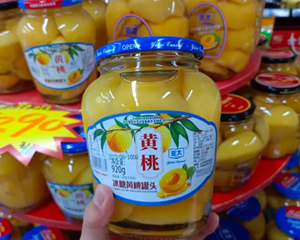A new shopping frenzy is taking place in China.
一场新的购物狂潮正在中国兴起。
As Chinese media reported, Chinese residents are emptying shelves of canned peaches, popularly seen in desserts and sweets,
据中国媒体报道,民众正在清空货架上的黄桃罐头,这种罐头经常是作为甜点和糖果出现,
as they believe it can help them boost their immune system.
因为他们认为黄桃罐头可以帮助他们增强免疫系统。
Chinese citizens are constantly hoarding cough medicine, flu drugs, masks, and related products.
最近,民众一直在囤积咳嗽药、流感药、口罩等相关产品。
And among them are canned peaches, a folklore sickness reliever in Northeastern China.
而这其中就包括了黄桃罐头,这是中国东北民间传说中的一种解病良药。
A person from Northeast China said, "I don't know why I eat canned peaches, but I do feel better after eating it."
一位来自东北地区的网友表示:“我不知道我为什么吃黄桃罐头,但吃完之后我身体确实感觉好多了。”
The internet is also full of praise for the treat, "We all know that going to the hospital to visit patients, you have to bring canned food."
对这一“良方”,网上也是称赞不已,“我们都知道去医院看病人,是必须要带罐头食品的。”

According to state media Global Times, virologist said that canned peaches could not replace medicine.
据官方媒体《环球时报》报道,病毒学家表示,黄桃罐头当然不能代替药物。
But fruits rich in antioxidants, such as vitamins C, D, and E, can help relieve symptoms like headaches and nausea.
但水果中富含抗氧化剂,如维生素C、D和E,可以帮助缓解头痛和恶心等症状。
In ancient Chinese culture, peach branches are said to ward off evil spirits.
在中国传统文化中,“桃枝”据说可以辟邪。
The fruit itself implies "health and longevity." This is because "peach" and "escape" are similarly pronounced as tao.
而这种水果本身就代表着“健康和长寿”。这是因为“桃”和“逃”的发音相同。
Therefore, this has resulted in a saying that eating peaches can help "escape disaster," or tao guo yi jie.
因此,这就产生了一个说法--吃桃子有助于“逃离灾难”,或“逃过一劫”。












